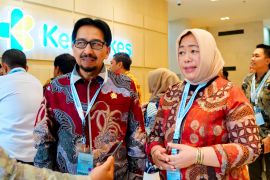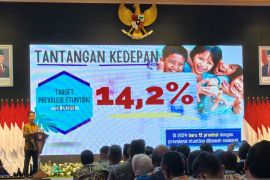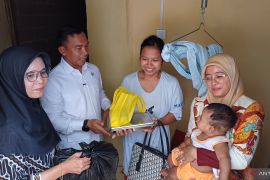"There is concern when we look at the World Population Review, which states that our nation's IQ rate is quite low compared to some other countries. One of the causes is the low material of our human resources, which are not optimal," BKKBN head Hasto Wardoyo said at the “IDIK Webinar: Communication on Caring for the Nation,” which was accessed from here on Wednesday.
In the World Population Review 2022, Indonesia’s average IQ rate placed it 130th out of 199 countries globally, he informed.
The IQ rate was lower compared to other neighboring countries, such as Laos (80.99), the Philippines (81.64), Brunei Darussalam (87.58), Malaysia (87.58), Thailand (88.87), Vietnam (89.53), and Myanmar (91.18).
Another indicator that pointed to the need for improving human quality development in Indonesia was the Human Capital Index (IMM), which placed Indonesia 6th in the Southeast Asian region based on the 2020 World Bank report.
The index only showed an increase of 0.1 from 2018, which was lower than for Malaysia, Thailand, Brunei Darussalam, Vietnam, and Singapore, although it was superior than for the Philippines, Cambodia, Myanmar, Laos, and Timor Leste.
These results show that national human resources development must be promoted further because the brain power and abilities and talents of children have yet to be honed optimally.
Related news: Govt aims to improve mother-child health service at vertical hospitals
The low score was caused by factors that had a repeated impact on the cycle of life, ranging from child marriages, which force children to drop out of school, low literacy, and the quality of education, to stunting, he elaborated.
"Our literacy rate is also low, our quality for high skills in terms of technology can also be said to be left behind," he said.
Then there are still health issues such as anemia among adolescents, the Maternal Mortality Rate (MMR) coupled with a tendency to choose instant food to supplement children's nutrition, which also causes billions of cells in a child's brain to not develop well.
Therefore, the government has started to pursue measures to improve the capacity and quality of the population in order to achieve its vision of Golden Indonesia by 2045, as stated in the sustainable development goals, by tapping into the potential of the demographic bonus, when the population in the productive age of 15–64 years exceeds that of other age groups.
The aim is to ensure that human resources become superior in cultural and technological aspects by 2045. The country's economy is also expected to become more advanced, sustainable, and equitable. Further, development throughout Indonesia is expected to be inclusive and the country democratic, strong, and clean.
To build human resources of good quality, their capabilities are not the only aspect that needs to be paid attention to, he said. One must also take into account the family's economy and equitable medical access, so that every child can grow and develop optimally.
Related news: Gov't intensifies child marriage prevention efforts to reduce stunting
Related news: Family plays important role in child's character development: Ministry
Translator: Hreeloita D S, Mecca Yumna
Editor: Suharto
Copyright © ANTARA 2022












